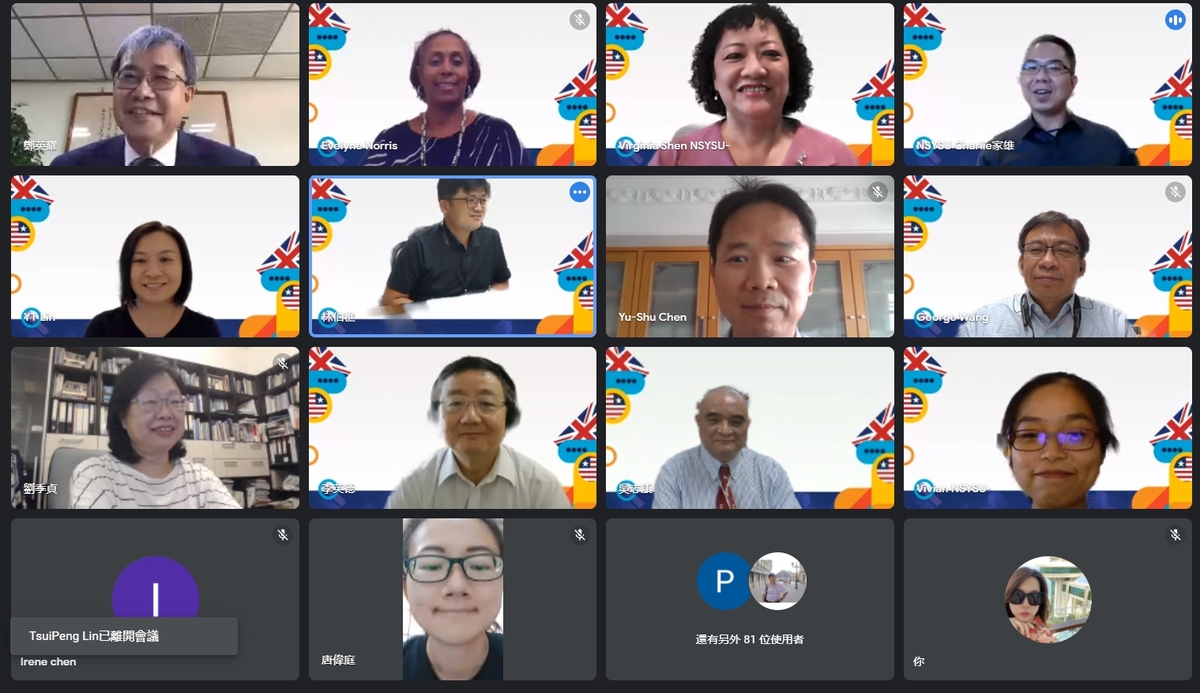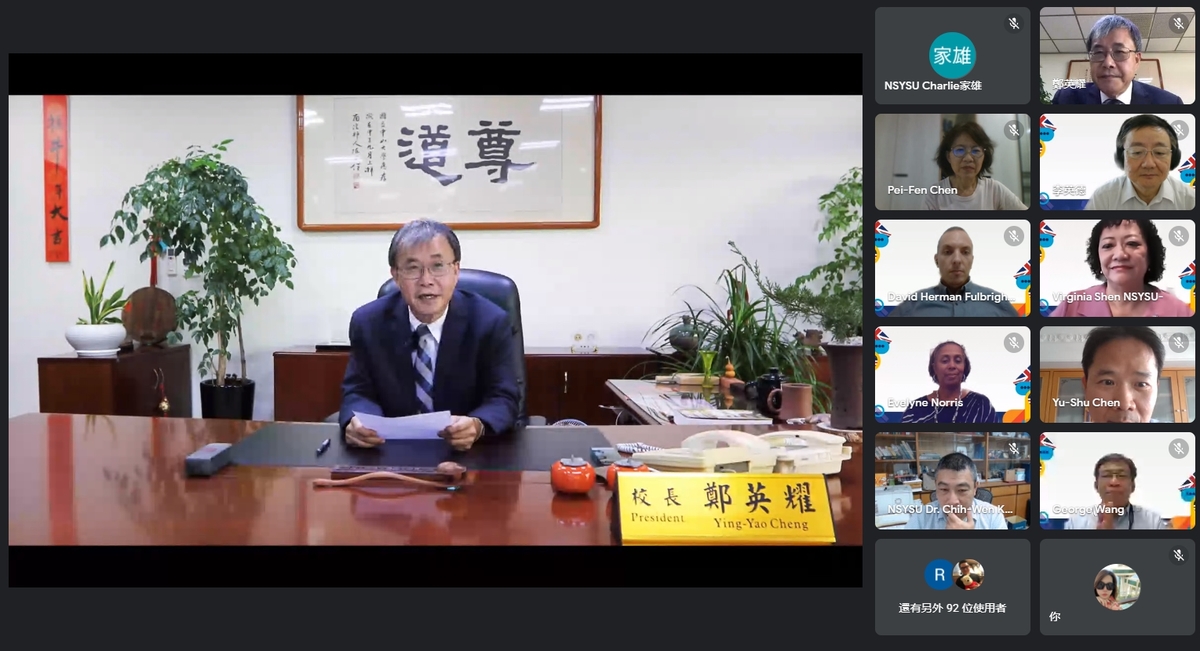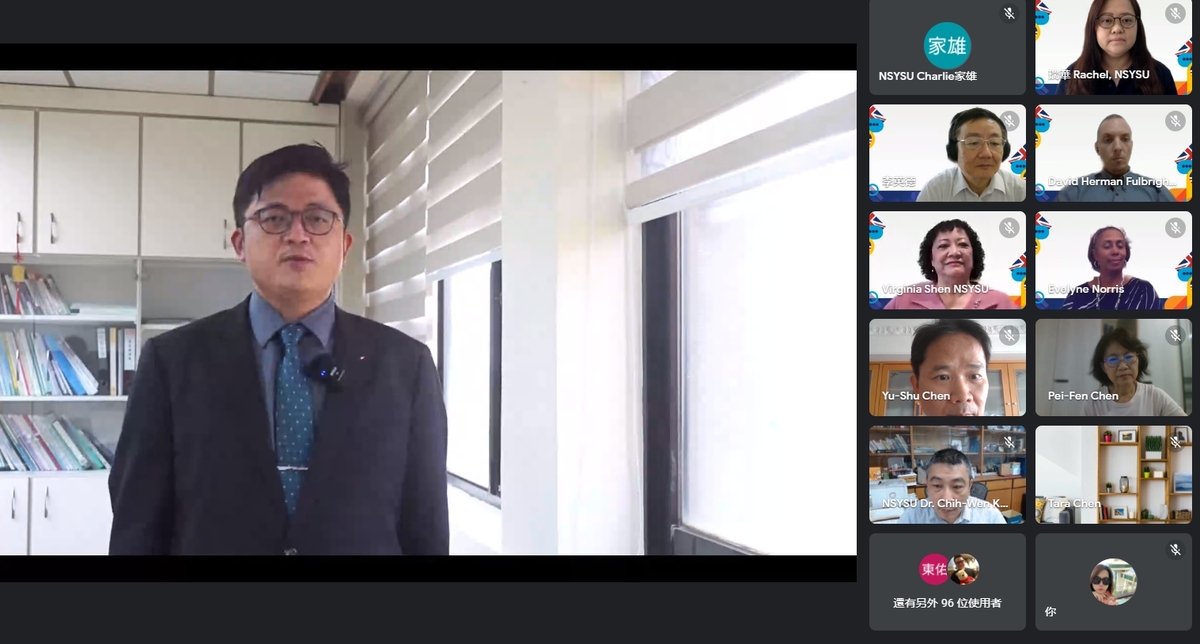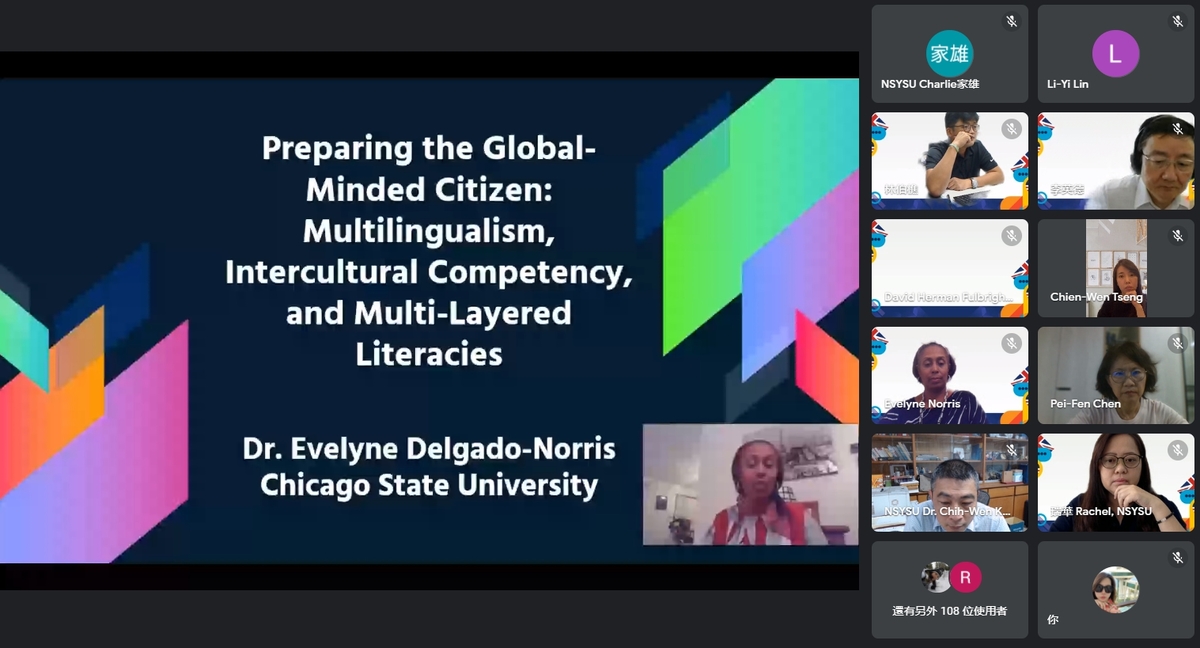Environment, culture, strategy: NSYSU hosts international forum on bilingual education to empower tomorrow’s talents




2021-10-13
(Provided by Si Wan College/Teaching and Learning Development and Resources Center) National Sun Yat-sen University organized an international academic forum: Bilingual Education in Taiwan: Challenges, Strategies, and Learning New Skills to Empower Tomorrow’s Talents, inviting scholars and experts from the USA, Japan, and Taiwan to discuss bilingual education. The speakers discussed such issues as building an engaging bilingual campus, fostering multicultural awareness, and enhancing EMI teaching and learning strategies, comprehensively investigated the present bilingual education environment in Taiwan, as well as shared EMI teaching strategies. Over 230 participants attended the forum online.
Associate Professor of the English, Foreign Languages & Literature Department of Chicago State University Dr. Evelyne Delgado-Norris gave a speech on “Preparing the Global-Minded Citizen Multilingualism, Intercultural Competency, and Multi-Layered Literacies”. Dr. Evelyne Delgado-Norris comes from a family of diplomats and grew up in different countries, which gave her diverse language and intercultural abilities. She could communicate across fields, exchange ideas, and collaborate with people of different ethnicities, which is also the key to solve regional problems and global disputes. What is more, with the progress of modern technology, when more information and concepts are spread than in the past, a new cultural field appeared. It does not only require multilingualism and intercultural competence, but also the development of the third pillar of multi-level literacy and relies on the combination of languages, culture, and literacy.
In the topic discussion on building a bilingual campus environment participated: Dr. David Herman of Fulbright Taiwan, NSYSU Associate Vice President for Academic Affairs Dr. Tong-Yu Hsieh, and CEO of NSYSU Center for EMI Teaching Excellence Dr. Virginia Shen. Dr. David Herman shared his experience as an English teacher in Taiwan and other countries and as an instructor of local English teachers. He gave many examples of how to create a bilingual campus environment and increase the use of the English language inside and outside the classroom. Dr. Hsieh introduced NSYSU’s 10-year project to launch education in English and promote a bilingual campus environment, and Dr. Shen introduced the Center for EMI Teaching Excellence, created to promote a bilingual campus. Dr. Shen explained that the Center is responsible for planning general education in English, designing special programs, and aligning the freshman general English courses with the Common European Framework of Reference for Languages (CEFR) in terms of course grading, textbook selection, course objectives, content design, and learning effectiveness assessment. The students will progress from courses suiting their English level to CEFR B2 level that will allow them to adjust to the department/institute's professional English courses. After classes, the events of the International Salon provide students with a series of hand-on, creative, and inspiring activities in English.
In the second topic discussion participated Dr. Yi-Ti Lin – Chair of the Department of English at Tamkang University, Dr. Emily Chi-Fen Chen – Chair of the Department of English at Kaohsiung University of Science and Technology, and Jeff Zhu – Director of the General Education Center at Takming University of Science and Technology to discuss "Fostering Multicultural Awareness in the English Classroom". Dr. Lin cited the example of the exchange between Japanese, Korean and Taiwanese students in her classroom: students from different countries communicate with each other in English and in the process, they better understand their own cultures, improve their cross-cultural communication skills, as well as increase their confidence in English-language communication. Dr. Chen pointed out that teaching a course in English in Taiwan is more than just switching between Chinese and English because there will be Taiwanese and international students in the classroom bringing in many different cultural values and so the teachers need to think about how to manage the course accordingly. Besides, while an English-language program can help students develop multicultural values and multiple-perspective thinking skills, what needs to be taken into account are the various problems that result from the encounter of different cultures. Dr. Zhu shared the difficulties he encountered teaching an English-language course in Chinese literature and the teaching methods he used.
The session on "Effective Strategies for English Medium Teaching and Learning" featured a discussion between Dr. George Wang of the Faculty of International Liberal Arts, Soka University, Dr. Ying-Te Lee of the Department of Photonics at Feng Chia University, Dr. Kenny Wu of the Department of Tourism Management at National Kaohsiung University of Science and Technology (NKUST), and Dr. Rae Lan of the Department of Foreign Languages and Applied Linguistics at National Taipei University. Dr. Wang pointed out that EMI teaching is already a trend at Japanese higher education institutions, and that EMI courses are mandatory at top universities in Japan. He summarized three important concepts for teaching in all English that he drew from his past experience: thinking of the world as whole, core values, and active learning. Dr. Ying-Te Lee, who taught professional courses in physics, focused on abandoning traditional teaching methods, such as one-sided transfer of knowledge in form of lectures and instead encouraged participation with teaching design and interaction with students to achieve. His students of the EMI course won awards in physics competitions. Dr. Wu pointed out that students entering NKUST from the technological and vocational education system face a bigger challenge when developing their English skills than those graduated from high school, and they are more nervous about speaking in the classroom. To solve this problem, Dr. Wu used technology tools to encourage their participation in EMI courses. Dr. Lan emphasized that the necessary elements of successful EMI education that the faculty, students, and administration should strive for are: a diverse student body, non-single-grade approach, and interactive learning.
NSYSU distinguished itself among 18 universities and was chosen by the MOE as one of 4 key cultivation schools of MOE’s Program on Bilingual Education for Students in College (BEST). NSYSU President Ying-Yao Cheng said that to achieve the goals of the government’s Bilingual Nation by 2030 Policy, it is of great importance that schools of all levels launch EMI courses. NSYSU aspires to be a leader among bilingual campuses in Taiwan and assist other schools and institutions in establishing bilingual education programs. NSYSU Vice President for Academic Affairs Po-Chiao Lin mentioned that NSYSU hosted the U.S.-Taiwan Education Initiative – Bilingual Education Symposium this year, established the Regional Resource Center for Bilingual Education and supported the Fulbright English Teaching Assistantship Program. These initiatives demonstrate the determination and success of NSYSU's efforts to create a bilingual campus. This forum is a new step forward in attaining the University's goal of becoming a globally leading bilingual university.
The international academic forum: Bilingual Education in Taiwan: Challenges, Strategies, and Learning New Skills to Empower Tomorrow’s Talents was organized by NSYSU Office of Academic Affairs and Center for EMI Teaching Excellence of Si Wan College and was sponsored by Association of National Universities of Taiwan.
(Edited by Public Affairs Division)
(Provided by Si Wan College/Teaching and Learning Development and Resources Center) National Sun Yat-sen University organized an international academic forum: Bilingual Education in Taiwan: Challenges, Strategies, and Learning New Skills to Empower Tomorrow’s Talents, inviting scholars and experts from the USA, Japan, and Taiwan to discuss bilingual education. The speakers discussed such issues as building an engaging bilingual campus, fostering multicultural awareness, and enhancing EMI teaching and learning strategies, comprehensively investigated the present bilingual education environment in Taiwan, as well as shared EMI teaching strategies. Over 230 participants attended the forum online.
Associate Professor of the English, Foreign Languages & Literature Department of Chicago State University Dr. Evelyne Delgado-Norris gave a speech on “Preparing the Global-Minded Citizen Multilingualism, Intercultural Competency, and Multi-Layered Literacies”. Dr. Evelyne Delgado-Norris comes from a family of diplomats and grew up in different countries, which gave her diverse language and intercultural abilities. She could communicate across fields, exchange ideas, and collaborate with people of different ethnicities, which is also the key to solve regional problems and global disputes. What is more, with the progress of modern technology, when more information and concepts are spread than in the past, a new cultural field appeared. It does not only require multilingualism and intercultural competence, but also the development of the third pillar of multi-level literacy and relies on the combination of languages, culture, and literacy.
In the topic discussion on building a bilingual campus environment participated: Dr. David Herman of Fulbright Taiwan, NSYSU Associate Vice President for Academic Affairs Dr. Tong-Yu Hsieh, and CEO of NSYSU Center for EMI Teaching Excellence Dr. Virginia Shen. Dr. David Herman shared his experience as an English teacher in Taiwan and other countries and as an instructor of local English teachers. He gave many examples of how to create a bilingual campus environment and increase the use of the English language inside and outside the classroom. Dr. Hsieh introduced NSYSU’s 10-year project to launch education in English and promote a bilingual campus environment, and Dr. Shen introduced the Center for EMI Teaching Excellence, created to promote a bilingual campus. Dr. Shen explained that the Center is responsible for planning general education in English, designing special programs, and aligning the freshman general English courses with the Common European Framework of Reference for Languages (CEFR) in terms of course grading, textbook selection, course objectives, content design, and learning effectiveness assessment. The students will progress from courses suiting their English level to CEFR B2 level that will allow them to adjust to the department/institute's professional English courses. After classes, the events of the International Salon provide students with a series of hand-on, creative, and inspiring activities in English.
In the second topic discussion participated Dr. Yi-Ti Lin – Chair of the Department of English at Tamkang University, Dr. Emily Chi-Fen Chen – Chair of the Department of English at Kaohsiung University of Science and Technology, and Jeff Zhu – Director of the General Education Center at Takming University of Science and Technology to discuss "Fostering Multicultural Awareness in the English Classroom". Dr. Lin cited the example of the exchange between Japanese, Korean and Taiwanese students in her classroom: students from different countries communicate with each other in English and in the process, they better understand their own cultures, improve their cross-cultural communication skills, as well as increase their confidence in English-language communication. Dr. Chen pointed out that teaching a course in English in Taiwan is more than just switching between Chinese and English because there will be Taiwanese and international students in the classroom bringing in many different cultural values and so the teachers need to think about how to manage the course accordingly. Besides, while an English-language program can help students develop multicultural values and multiple-perspective thinking skills, what needs to be taken into account are the various problems that result from the encounter of different cultures. Dr. Zhu shared the difficulties he encountered teaching an English-language course in Chinese literature and the teaching methods he used.
The session on "Effective Strategies for English Medium Teaching and Learning" featured a discussion between Dr. George Wang of the Faculty of International Liberal Arts, Soka University, Dr. Ying-Te Lee of the Department of Photonics at Feng Chia University, Dr. Kenny Wu of the Department of Tourism Management at National Kaohsiung University of Science and Technology (NKUST), and Dr. Rae Lan of the Department of Foreign Languages and Applied Linguistics at National Taipei University. Dr. Wang pointed out that EMI teaching is already a trend at Japanese higher education institutions, and that EMI courses are mandatory at top universities in Japan. He summarized three important concepts for teaching in all English that he drew from his past experience: thinking of the world as whole, core values, and active learning. Dr. Ying-Te Lee, who taught professional courses in physics, focused on abandoning traditional teaching methods, such as one-sided transfer of knowledge in form of lectures and instead encouraged participation with teaching design and interaction with students to achieve. His students of the EMI course won awards in physics competitions. Dr. Wu pointed out that students entering NKUST from the technological and vocational education system face a bigger challenge when developing their English skills than those graduated from high school, and they are more nervous about speaking in the classroom. To solve this problem, Dr. Wu used technology tools to encourage their participation in EMI courses. Dr. Lan emphasized that the necessary elements of successful EMI education that the faculty, students, and administration should strive for are: a diverse student body, non-single-grade approach, and interactive learning.
NSYSU distinguished itself among 18 universities and was chosen by the MOE as one of 4 key cultivation schools of MOE’s Program on Bilingual Education for Students in College (BEST). NSYSU President Ying-Yao Cheng said that to achieve the goals of the government’s Bilingual Nation by 2030 Policy, it is of great importance that schools of all levels launch EMI courses. NSYSU aspires to be a leader among bilingual campuses in Taiwan and assist other schools and institutions in establishing bilingual education programs. NSYSU Vice President for Academic Affairs Po-Chiao Lin mentioned that NSYSU hosted the U.S.-Taiwan Education Initiative – Bilingual Education Symposium this year, established the Regional Resource Center for Bilingual Education and supported the Fulbright English Teaching Assistantship Program. These initiatives demonstrate the determination and success of NSYSU's efforts to create a bilingual campus. This forum is a new step forward in attaining the University's goal of becoming a globally leading bilingual university.
The international academic forum: Bilingual Education in Taiwan: Challenges, Strategies, and Learning New Skills to Empower Tomorrow’s Talents was organized by NSYSU Office of Academic Affairs and Center for EMI Teaching Excellence of Si Wan College and was sponsored by Association of National Universities of Taiwan.
(Edited by Public Affairs Division)
Click Num:
Share
